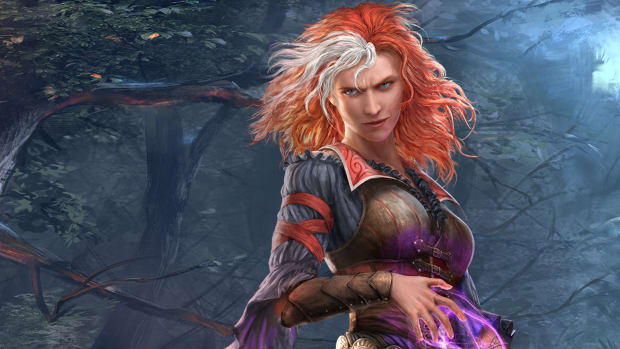
Baldur’s Gate 3 review: this is what we’ve been missing
It’s hard being The Dark Urge. Every night I dream of death; pushing my claws into a soft stomach and pulling out intestines like a clown’s handkerchief, my victims are fleshy easels for my macabre art. But it’s more than just a dream. I wake up with my arms bloodied up to the elbows, there’s a mutilated corpse at my feet, and my party members are asking questions that are already answered by the mutilated corpse at my feet.
Fast forward 20 hours and all but one of my party members are dead. I mean dead-dead. Perma-dead. One of them is missing a head and another is in pieces. There’s no magic in the world that’ll sort that lot out.
They believed me when I told them that I wasn’t in control when I killed the bard, but they’re not happy about me tearing our vampire friend to pieces in his sleep. By the beginning of Act 2, only Shadowheart remained by my side, but even she had stopped talking to me a while back because my co-op partner romanced her before I could get my dragon D out.
My experience in Baldur’s Gate 3 won’t be the same as yours. With a wide selection of pre-made characters to choose from – each with their own backstory, religion, and motivations – as well as custom characters who you can build out however you wish, there’s a new experience every time you replay this 100-hour RPG.
The fact that it still took me 100 hours, even though I’d snuffed out the lives of at least ten people who each had their own personal, multi-quest side adventures, gives you an idea of how deep this rabbit hole goes. Baldur’s Gate 3 is one of the greatest RPGs ever made – a reminder of what we had before everything was dumbed down by market research.
I’m at the point in my life where the prospect of replaying a game – especially one as meaty as this – is a daunting one. There are only so many hours in the day. But this game is special. Every life I extinguish, every bad decision I make, will just make my next playthrough better. I’m already planning the next character in my head – a wise monk who plies themselves with booze and becomes a drunken master of martial arts. If games are a power fantasy, this first playthrough is all about spiraling without consequence.
I don’t know why I’m like this, but my co-op partner tells me that I’ve ruined their game (affectionately). I get what they mean. I miss Karlach the most, a fiery tiefling barbarian who wants to be touched but has a mechanized heart that turns her skin hotter than a rotisserie chicken. There’s Wyl, a monster hunter who’s under the thumb of a demon queen. There’s Lae'zel. She exists. The party in Baldur’s Gate 3 is one of the most delightfully dysfunctional groups of people you could ever meet – each of their stories is laced with delicious irony – and they’re all dead.
Then there was the time when we took a quest to steal an egg. I got payment upfront, stole the egg, brought it to the person who paid us, and booted it off a cliff. And this was a dialogue option! I could have just thrown the egg off a cliff without entering dialogue because the game’s systems are also set up to allow you to do the most unhinged things.
Playing as The Dark Urge, you can either resist these compulsions or lean into them, but you’re punished for resisting and rewarded with power if you let them take you. I want power. Larian has written this character in such a way that there’s usually some deranged option to every conversation, and even without the promise of raw power from indulging in these base desires, it’s a fight to resist the temptation of choosing them. They’re just so well done. It’s not just the voices The Dark Urge hears – the game’s writers become the devil on your shoulder, whispering to you: “Do it. Be a chaos goblin.”
Maybe next time I won’t rip Gale’s arm off and carry it around with me for the entire game. Maybe I’ll recruit him to my party and actually speak to him. Maybe see his face before I ruin his life. Maybe I won’t scare children and animals. Maybe I’ll be a normal, innocent man.
Baldur’s Gate 3 is as close to the improv comedy and drama of Dungeons & Dragons as we’ve ever got in digital form.
What Larian has done here is staggering. Almost every animal in the game – from rats to squirrels and oxen – is a proper character if you have Animal Speaking potions to hand. And even if you don’t, the Animal Handling skill might allow you to intuit them. When a character dies, you can often use a Speak to the Dead spell to get more information out of them from beyond the grave. There are so many things to see and do and people and things to talk to that it makes your head spin.
When you finally reach the city of Baldur’s Gate, it’s overwhelming how many people there are to interact with, and how many quests there are to tackle. I’ve lost count of the times I’ve gone to check out a side room and it’s ended up leading me to an entirely new area with dozens more NPCs, quests, puzzles, and stories to uncover. I feel like a single-cell organism being shaken around inside a snow globe.
Almost everything is simulated, too. If you think something should work – say, casting the Silence spell to make sure sentries can’t shout for help as you cut them down – it probably will. Elements interact with each other, doors can be unlocked, picked, or destroyed, teleportation and flight can get you into areas that are otherwise inaccessible, bridges can be knocked out, and the list goes on.
It builds upon the turn-based combat system of Divinity: Original Sin 2 to create one of the wildest combat sandboxes ever made. Where most games turn magical abilities into different colored bullets, Baldur’s Gate 3 paints magic as untamed energy. It doesn’t discriminate between friend or foe, and careless spell-casting can cause more harm than good. Towns and buildings become smoldering graveyards when the dust settles on a battle.
What really makes combat shine, however, brings us back to the incredible writing and narrative design team. Almost every fight has context and it’s rare that you stumble into one just because. There’s a little story behind almost every character and creature in the game, and that makes you care more about every seemingly innocuous encounter. It’s genius. Baldur’s Gate 3 is exactly what we’ve been missing and the best game of 2023 so far.
Score: 10/10
- Story: 10/10
- Visuals: 9/10
- Audio: 9/10
- Gameplay: 10/10
Version tested: PC
Baldur’s Gate 3 technical breakdown
For the most part, Baldur’s Gate 3 runs excellently on a high-powered PC, as you’d expect. I experienced some frame rate issues when I first entered Baldur’s Gate itself, but these may have been related to my hard drive being full (the specs recommend an SSD). When I cleared some space on my hard drive, things ran smoothly again. Sometimes enemies take a little while to take their moves in some of the more complex battles, and I’ve seen the odd small visual bug with the camera struggling to find the right dynamic angles during conversations. It also takes a while for scenery to load in when you fast-travel vast distances. None of this affected my enjoyment of the game.







